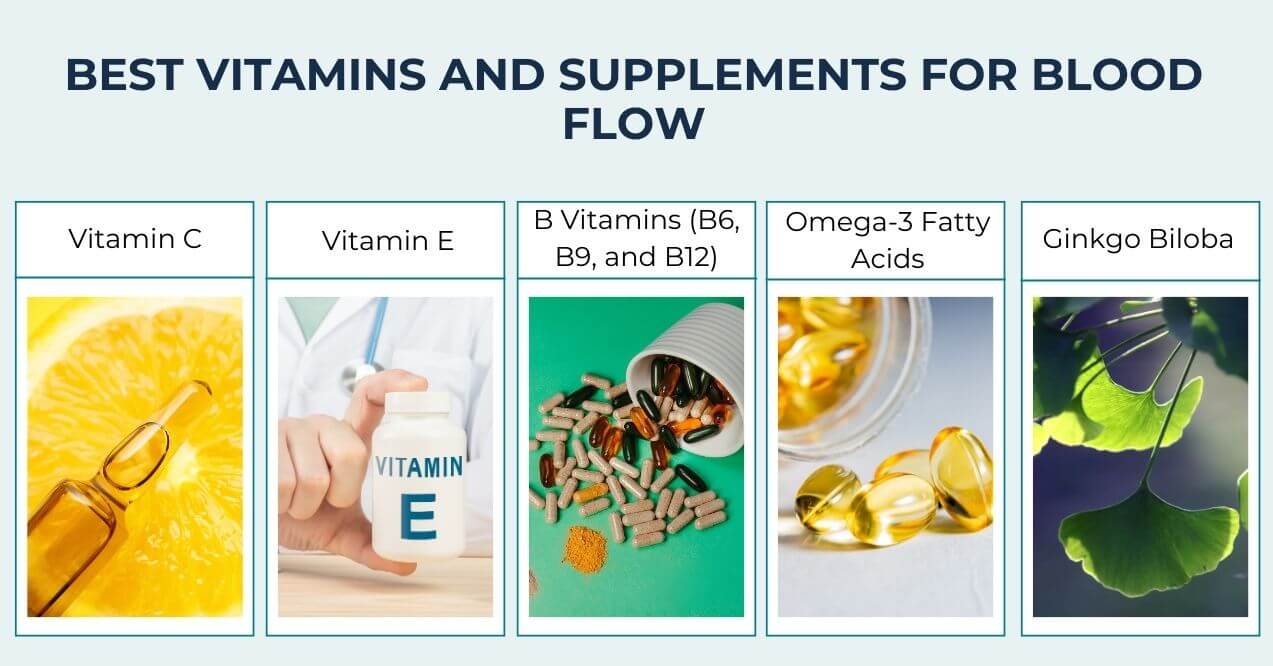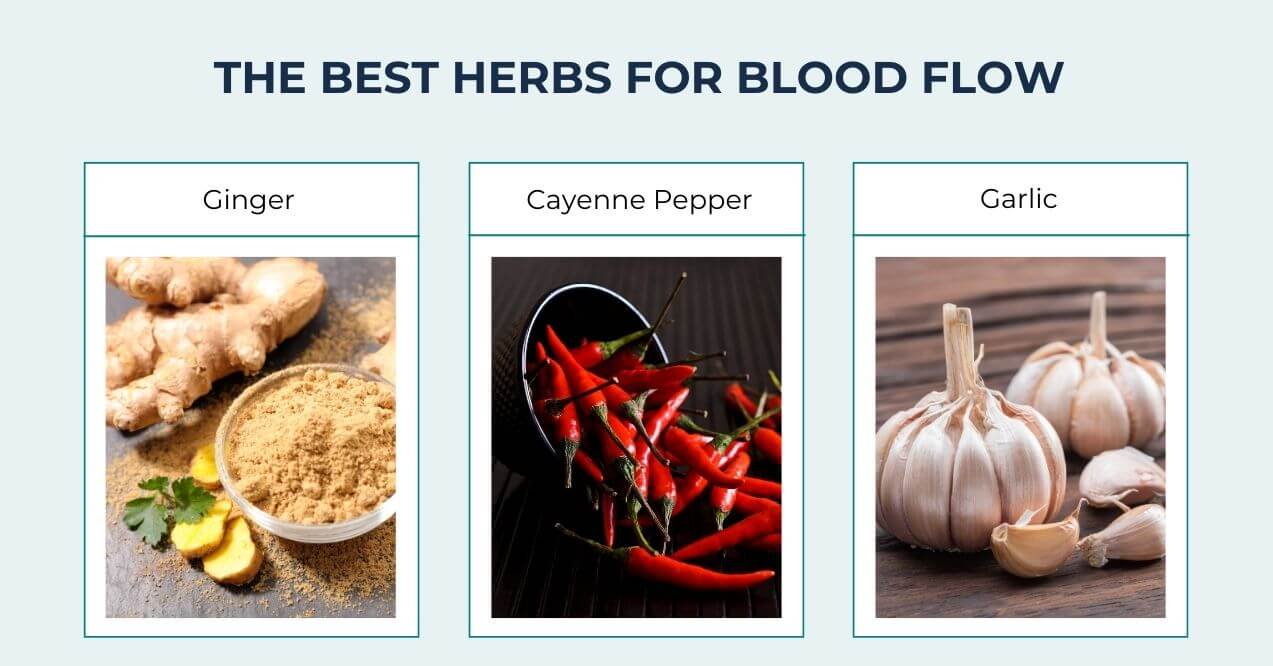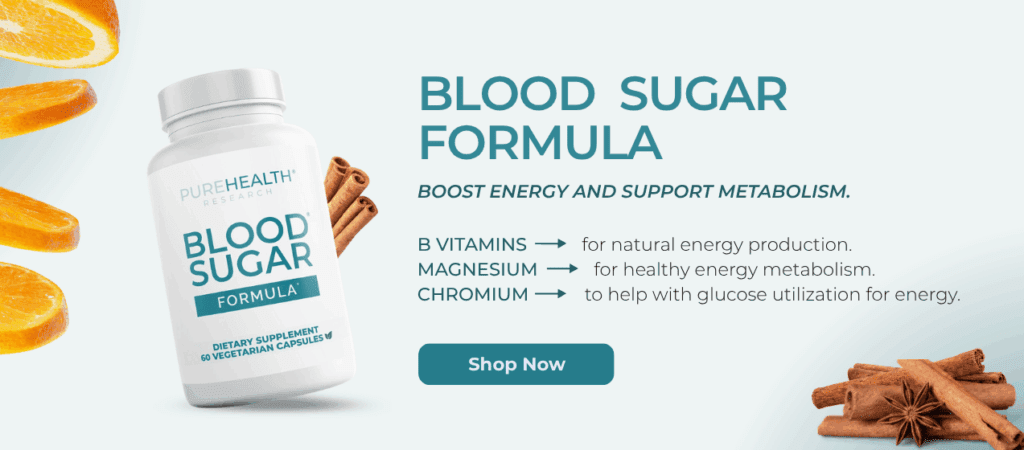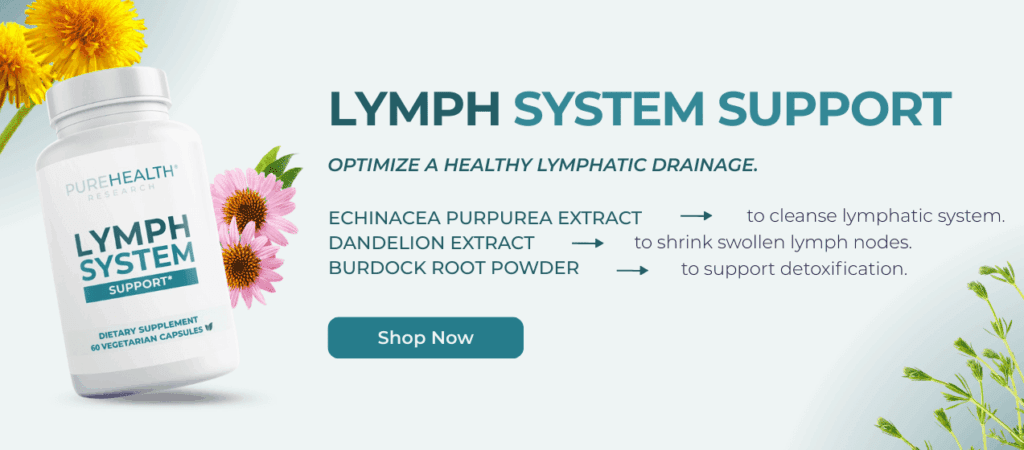A Complete Guide to the Best Vitamins for Blood Flow
Discover the best vitamins for blood flow. Learn how C, E, and B vitamins, plus Omega-3s, support your vascular health.


Good blood flow is vital for life, ensuring oxygen and nutrients reach every cell while removing waste efficiently. When circulation slows, it can cause fatigue, cold extremities, and low energy. Factors like aging, diet, and inactivity can all affect how well blood moves through your vessels. That’s why learning about the best vitamins for blood flow can help you understand which nutrients support optimal vascular function and overall vitality.
What Affects Blood Flow?
Several factors may reduce blood flow in your body. Aging naturally affects vessel flexibility, while poor dietary choices may lead to plaque buildup in arteries. Physical inactivity allows blood to pool in your extremities, especially in your legs and feet.
Smoking damages blood vessels directly, narrowing them and reducing oxygen delivery. Certain health conditions that impact blood flow:
- High blood pressure strains vessel walls.
- Diabetes affects small blood vessels.
- Excess weight puts additional pressure on your vascular system.
Improving blood flow benefits your entire body, from brain function to foot health. Better blood flow means more energy, warmer extremities, and potentially improved healing throughout your tissues.
Best Vitamins and Supplements for Blood Flow

The best vitamins for blood flow work through different mechanisms to support your vascular system. Some strengthen vessel walls, others reduce inflammation, and certain nutrients help your blood flow more freely. Here are the most effective options backed by research.
Vitamin C
Vitamin C supports healthy blood vessels by promoting collagen production. Collagen forms the structural foundation of your vessel walls, keeping them strong yet flexible. This vitamin also acts as an antioxidant, protecting vessels from damage caused by free radicals.
Daily vitamin C intake may help maintain proper vessel function. Foods rich in vitamin C include:
- Citrus fruits
- Bell peppers
- Strawberries
- Broccoli
Most adults need 75-90mg daily, though some research suggests higher amounts may provide additional circulatory benefits.
Vitamin E
Vitamin E functions as a powerful antioxidant that may help against excessive blood clotting. By protecting arterial walls from oxidative stress, this vitamin potentially helps maintain smooth blood flow. It works alongside other nutrients to support overall vascular health.
Good sources of vitamin E include almonds, sunflower seeds, and spinach. The recommended daily amount is 15mg for adults. Taking vitamin E with foods containing fat improves absorption.
B Vitamins (B6, B9, and B12)
B vitamins play essential roles in red blood cell formation and circulation. Vitamin B6, B9 (folate), and B12 work together to regulate homocysteine levels. High homocysteine may damage blood vessels and restrict flow.
These vitamins support circulation through:
- B6 – Helps form hemoglobin for oxygen transport
- B9 – Supports new cell production
- B12 – Maintains healthy nerve and blood cells
Many adults, may benefit from B vitamin supplementation due to decreased absorption with age.
Omega-3 Fatty Acids
Omega-3 fatty acids rank among the best supplements for blood flow due to their anti-inflammatory properties. These healthy fats may reduce arterial inflammation and make blood less sticky, potentially lowering the risk of clot formation. EPA and DHA, the active forms of omega-3s, directly support vascular health.
Research suggests omega-3s may improve circulation by keeping arteries flexible and reducing triglyceride levels. Aim for 1-2 grams daily from sources including fatty fish, flaxseeds, or quality fish oil supplements. The 2024 map of omega-3 fatty acids deficiency reveals which regions worldwide maintain adequate levels and where intake may need improvement.
Ginkgo Biloba
Ginkgo Biloba has been used for centuries to support circulation, particularly to the brain and extremities. This herb may dilate blood vessels and reduce blood viscosity, allowing improved flow throughout your body. Many people report warmer hands and feet after regular ginkgo supplementation.
Studies indicate ginkgo may be especially beneficial for peripheral circulation. Standard doses range from 120-240mg daily, divided into two or three servings. Allow 4-6 weeks to notice potential benefits.
The Best Herbs for Blood Flow

Natural herbs offer gentle yet effective support for circulation. These plant-based remedies have helped people maintain healthy blood flow for generations. What vitamins increase blood flow works well with herbal support for comprehensive circulatory health.
Ginger
Ginger stimulates circulation by potentially relaxing blood vessels and reducing inflammation. This warming herb may improve blood flow to extremities and support overall vascular health. Active compounds called gingerols provide these circulatory benefits.
Fresh ginger root, ginger tea, or standardized supplements all offer potential benefits. Most studies use 1-3 grams of ginger daily for circulation support.
Cayenne Pepper
Cayenne pepper contains capsaicin, which may boost circulation by stimulating blood flow throughout your body. This compound potentially increases heart rate slightly and helps dilate blood vessels. The warming sensation you feel indicates increased blood flow to the area.
Start with small amounts (1/4 teaspoon) and gradually increase as tolerated. Cayenne works well added to foods or taken in capsule form for those sensitive to spicy foods.
Garlic
Garlic supports circulation through multiple mechanisms. Its sulfur compounds may help widen blood vessels and reduce arterial plaque formation. Regular garlic consumption potentially lowers blood pressure and improves overall blood flow.
Fresh garlic provides the most benefits – aim for 1-2 cloves daily. Aged garlic supplements offer a odorless alternative while maintaining circulatory benefits. Those with spider veins on ankles may find garlic particularly helpful as part of a comprehensive circulation support plan.
How to Support Blood Flow Through Lifestyle Changes
Lifestyle modifications amplify the effects of the best vitamins for blood flow. Regular physical activity stands as the most powerful way to improve blood flow naturally. Even 30 minutes of daily walking can significantly support blood flow, especially in your legs and feet.
Diet plays an equally important role. Focus on:
- Colorful fruits and vegetables rich in antioxidants
- Whole grains for sustained energy
- Lean proteins to support tissue health
- Adequate water intake (8-10 glasses daily)
Certain habits harm blood flow and should be minimized. Smoking constricts blood vessels immediately, while excessive alcohol affects blood pressure. Prolonged sitting allows blood to pool, so stand and move every hour. Maintaining a healthy lymphatic system also supports overall blood flow, as these two systems work together to move fluids throughout your body. Learning to detox your lymphatic system naturally may further support healthy blood flow in your body.
Supplements to Consider for Blood Flow
Beyond individual vitamins and herbs, comprehensive formulas can provide targeted blood flow support. These specialized supplements combine multiple ingredients for synergistic benefits.
Blood Sugar Formula
Blood Sugar Formula supports blood flow by helping maintain healthy blood sugar levels. Stable blood sugar protects small blood vessels from damage and promotes better overall blood flow. This formula combines chromium, cinnamon, and other nutrients that work together to support metabolic health and blood flow.

Lymph Support
Lymph System Support aids blood flow by promoting healthy lymphatic drainage. Your lymphatic system works alongside blood vessels to remove toxins and maintain fluid balance. Understanding your lymphatic drainage map helps you see how this system connects throughout your body. This supplement contains herbs traditionally used to support lymph flow, which indirectly benefits blood flow.

For a complete selection of blood flow and circulation-supporting options, explore our Supplements for Circulation collection.
Conclusion
Supporting healthy blood flow requires a combination of the right nutrients and lifestyle choices. The best vitamins for blood flow – including C, E, and B vitamins – work alongside omega-3s and beneficial herbs to maintain vascular health. Regular movement, a nutrient-rich diet, and targeted supplementation create a comprehensive approach to circulation support that may help you feel more energetic and comfortable throughout your day.
Vitamins C, E, and B vitamins (especially B6, B9, and B12) are the most beneficial for circulation. These nutrients support vascular health by strengthening blood vessel walls, reducing inflammation, and promoting healthy blood cell formation. Combined with omega-3 fatty acids, they create a strong foundation for circulatory support.
Yes, vitamin B12 may support blood flow by helping form healthy red blood cells and maintaining proper nerve function. B12 works with other B vitamins to regulate homocysteine levels, potentially protecting blood vessels from damage. Adequate B12 levels are especially important for older adults who may have reduced absorption.
Magnesium may support blood flow by helping blood vessels relax and maintaining healthy blood pressure. This mineral assists in over 300 body processes, including those affecting circulation. While not covered extensively above, magnesium works well with other circulation-supporting nutrients for comprehensive vascular health.
Sign up for our Healthy Living newsletter!
Advertisement. This site offers health, wellness, fitness and nutritional information and is designed for educational purposes only. You should not rely on this information as a substitute for, nor does it replace, professional medical advice, diagnosis, or treatment. If you have any concerns or questions about your health, you should always consult with a physician or other health-care professional. Do not disregard, avoid or delay obtaining medical or health related advice from your health-care professional because of something you may have read on this site. The use of any information provided on this site is solely at your own risk.






